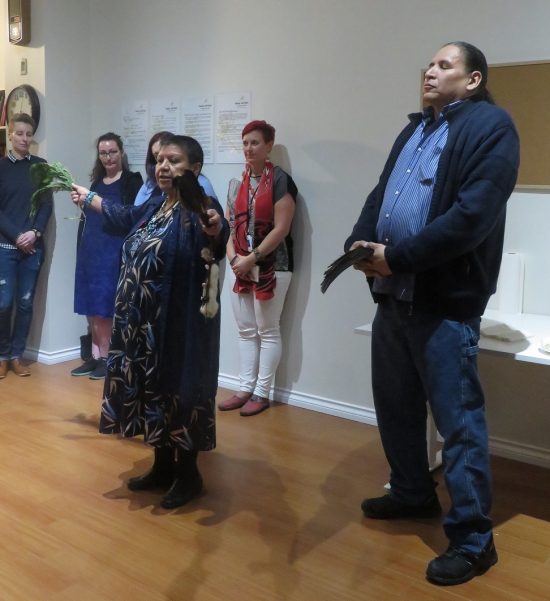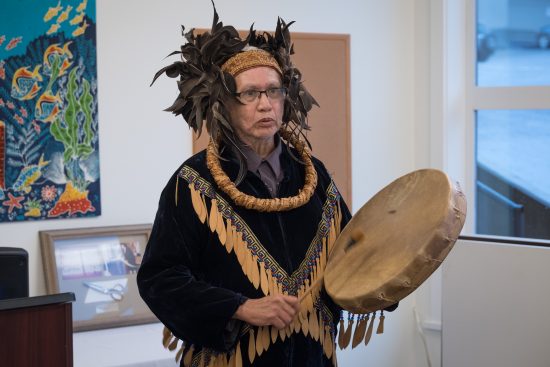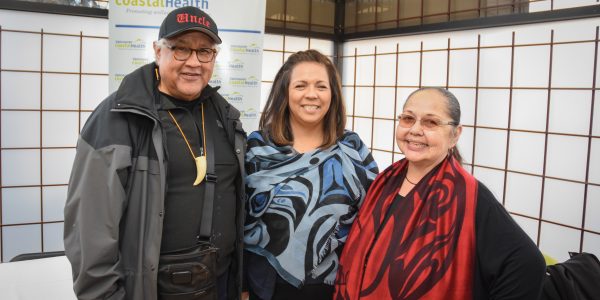Elders in Residence program launches at Heatley Community Health Centre
On Monday, the Heatley Community Health Centre (CHC) in Vancouver’s Downtown Eastside celebrated its re-opening with a new model of care and specialized services all combined at one location. One of the new services being provided at this clinic is to have Indigenous Elders as part of the primary care team. Indigenous Elders are increasingly being supported to be part of care teams across VCH. They are in place at a number of services including HOpe Centre, George Pearson Centre, Sheway, Downtown CHC, Pender CHC, and will be soon in place at VGH.
About Indigenous Elders
While we often hear the word elder used when discussing an older person, the term Elder (with a capital E) has another meaning in an Indigenous context. The definition of Elder varies from Nation to Nation, and community to community, but an Elder is generally described as a person recognized by their own community as being the carriers of the wisdom and teachings of their culture.
The inclusion and recognition of Indigenous Elders as contributing members of primary care teams has been shown to have a positive impact for clients and the whole care team. Elders’ life experience, historical perspective, spiritual knowledge, and cultural connections make them a valuable resource.
Elder Ruth Alfred, one of the Elders working in the program says, “ The work we do as Elders in Residence in the Downtown Eastside is so important because in every community, there is work to be done, wounds to heal and in our hearts we have the power to do it. We just have to take the time to listen without judgement, and give a kind word to those who are hurting.”Research from Vancouver Native Health Society shows that working with Indigenous Elders results in a significant reduction in depressive symptoms and suicide risk for primary care clients. They are also integral in helping staff understand Indigenous culture and traditional healing approaches as they work alongside each other.
Elder Glida Morgan has been supporting VCH programs for a while and describes her approach, “I try to show and teach about kindness. I don’t judge. I believe we should be kind to yourself and to others, and laugh! That’s where relationships start and the healing takes place.”We are honored to be able to support the Elders in their role as members of the care teams and will continue to grow and strengthen Elder inclusion to help create a culturally safe health care organization envisaged by our leadership, and expected by our Aboriginal populations.

Elders Roberta and Blair blessing Haven House
Staff Information
There are many different ways Aboriginal Elders will work within the VCH health care system:
- Provide a ceremonial welcoming
- Acknowledgement of First Nations Traditional territory, or prayer for an event or workshop
- Support for Aboriginal persons and families
- Provide traditional healing or ceremonies (such as a smudge ceremony)
- Conduct a cleansing ceremony for a building or a room
Aboriginal clients and family members utilizing VCH services may request access to Aboriginal Elders or Traditional Practitioners (Spiritual/cultural leaders or healers) for cultural ceremonies and support. This is true especially during times of acute illness, grief and loss, or rites of passage. Here are some of the steps VCH staff can use when helping Aboriginal clients access Elders or Traditional Practitioners:
- Arrange access to the health care environment
- When possible, provide a separate space for the Elders and family to do their work together
- Consult with the Elder/Traditional Practitioner to see what they may require for the facilitation of their work (i.e. booking room space)
- Ask the Elder if they would like to be introduced to your staff
- Ensure that staff and other clients respect the space of the client and family during the ceremony
- Respect the traditional items the Elder/ Traditional Practitioner may be using
- Provide an honorarium and cultural acknowledgement if appropriate
- Document access to cultural services in the client’s health care plan
VCH staff may access more information on honorariums, traditional ceremonies, or medicines, Traditional Practitioners and other aspects by contacting Leslie Bonshor.

Elder Latash Nahanee providing opening song at Gibson’s Health Unit.

